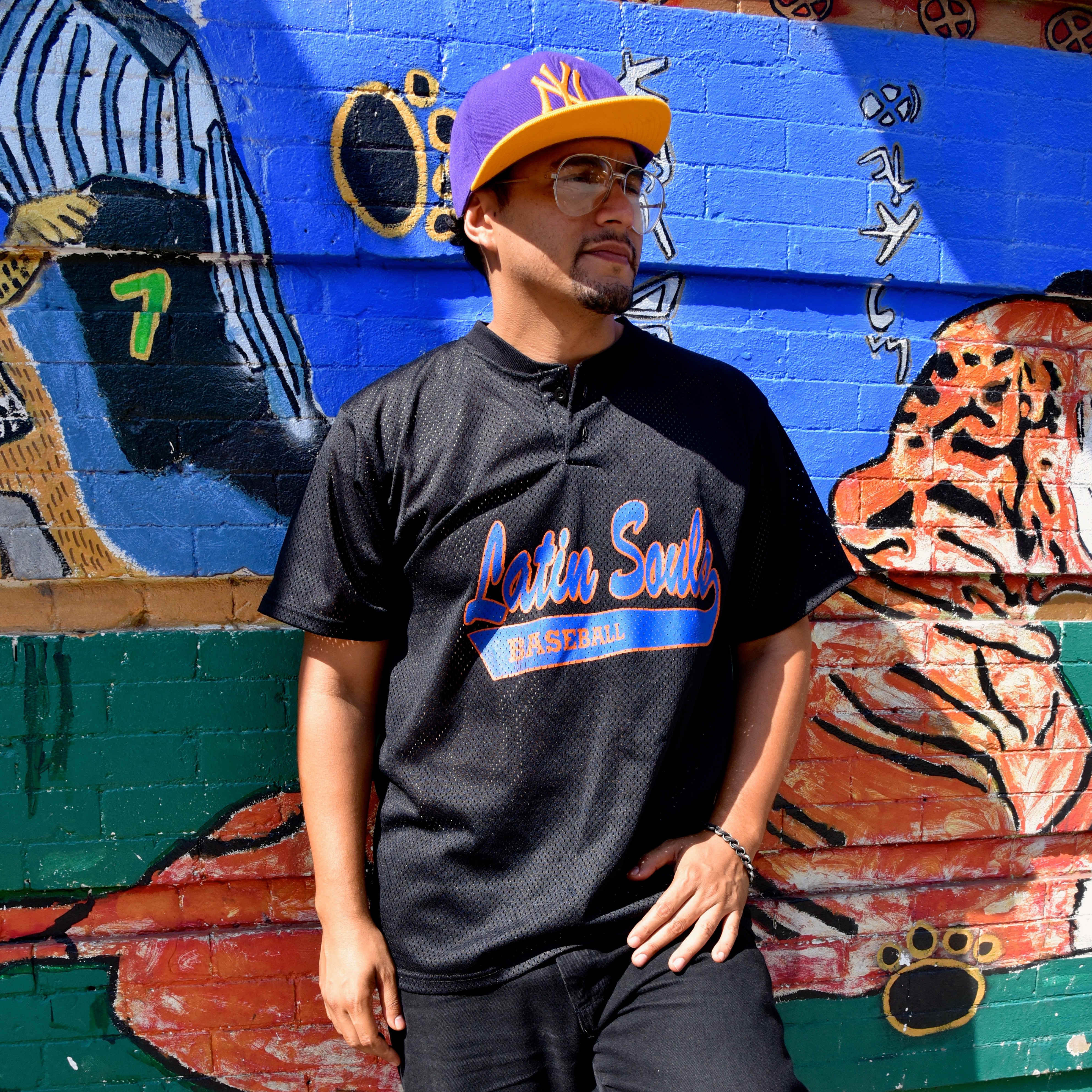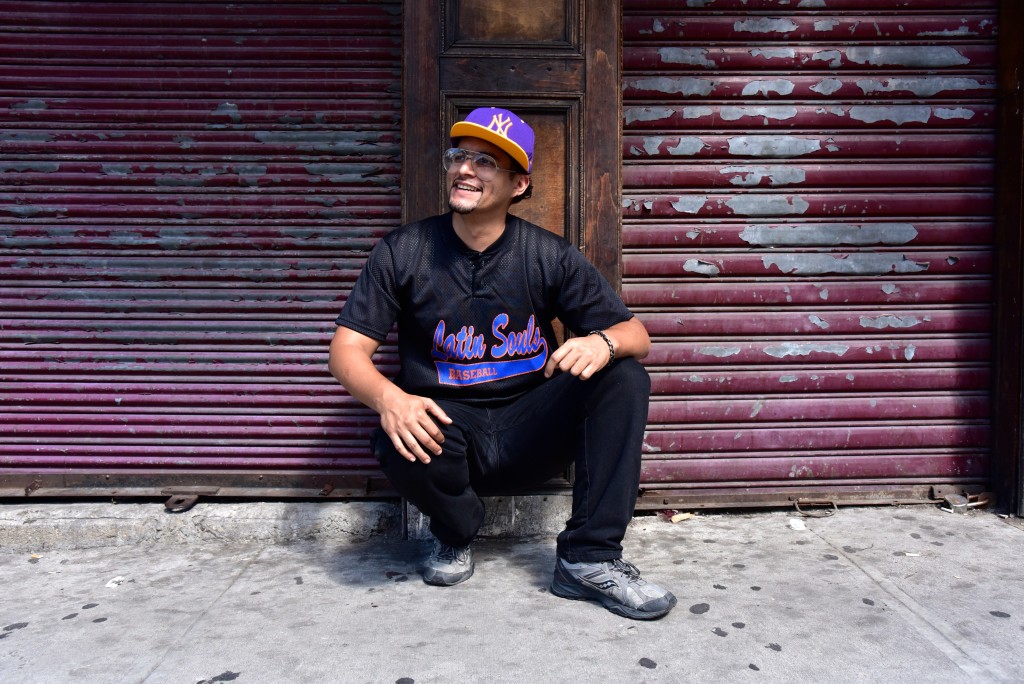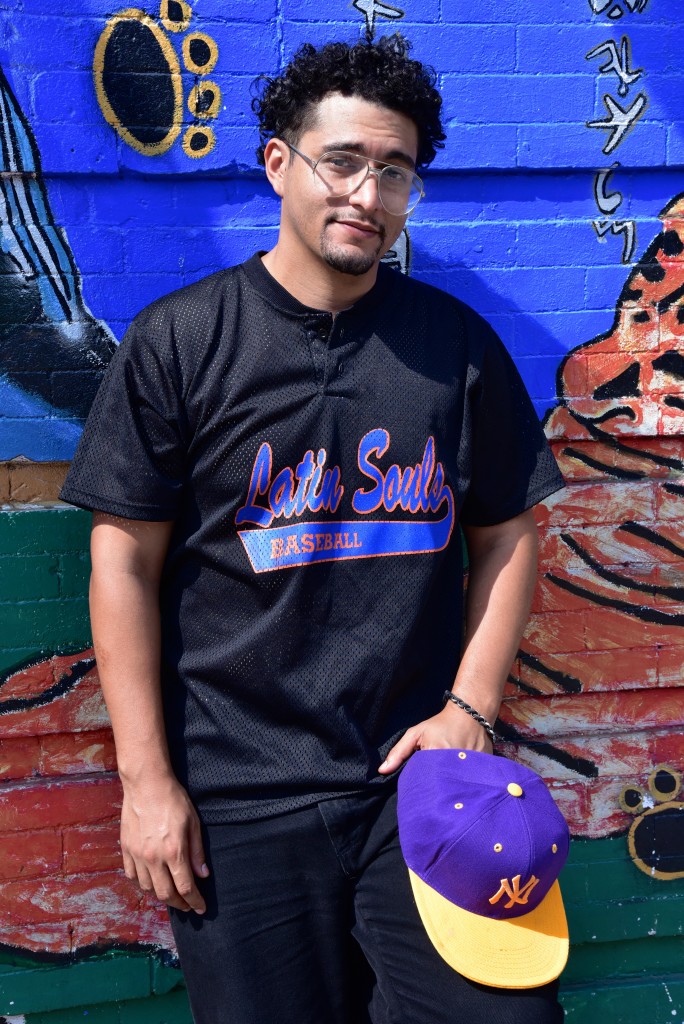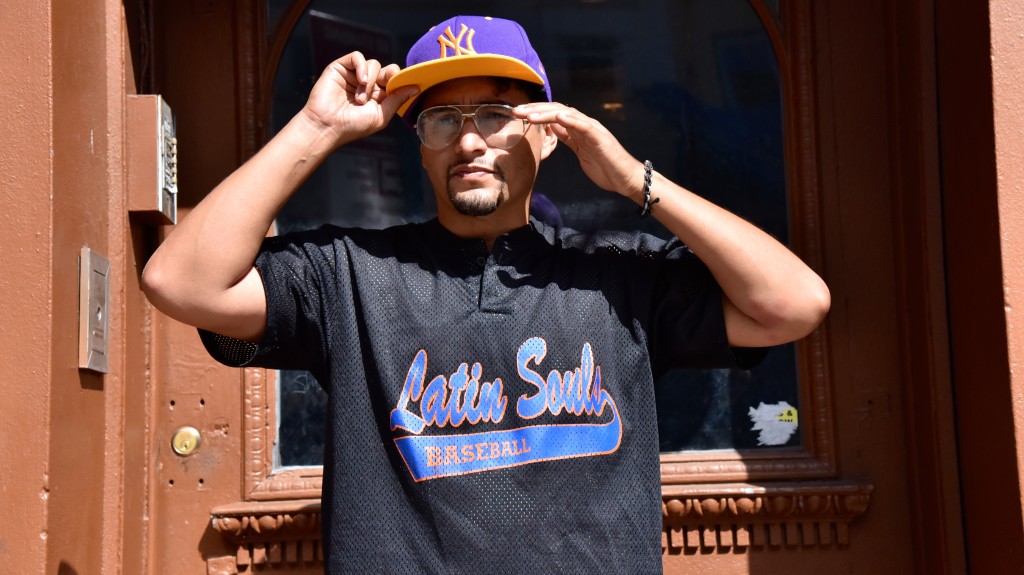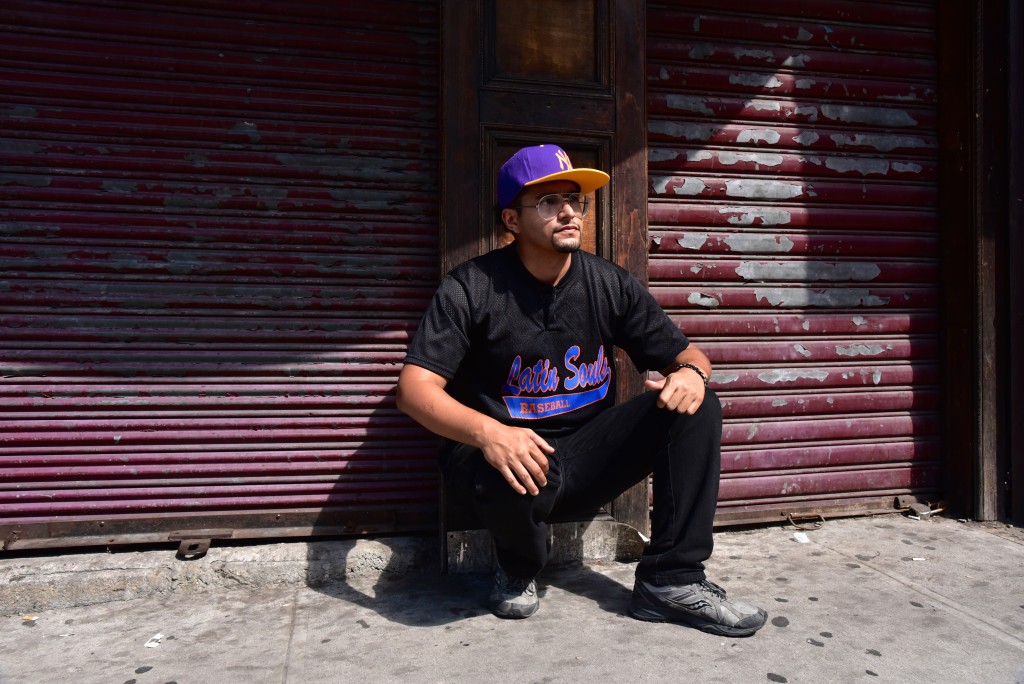Geko Jones is a New York-based DJ, who, along with Uproot Andy, hosts the monthly Que Bajo?! dance party at The Wick in Brooklyn. For much of Geko's career, he has mixed vintage Afro-Latin tracks with electronic production. For his latest project, Ralfi Pagan: Latin Soul Remixed, Geko is working with Fania Records to revive the legacy of Ralfi Pagan, a little-known Nuyorican soul singer from the '60s and '70s, who was tragically murdered in Colombia in 1978. Until now, Ralfi's full story has never been told. The album's first video for a remix of Ralfi's song "Latin Soul" by producer Banginclude premiered last Friday on Thump. Afropop writer Jesse Brent met up with Geko at Richol Café and Bakery, near his apartment in Crown Heights to talk about Ralfi and his plans for global barrioteca. All photos for this piece were taken by Hil Steadman.
Jesse Brent: First of all, is Geko your real name?
Geko Jones: No, it is a play on words. It is a big joke and a big farce that I get away with that. Que cojones is how you would say it in Spanish--well, in Spanglish, I guess. Basically, my favorite thing is that every time I get on TV in the back of taxicabs is to see my name on TV and get away with that--a small jab at the system.
Let’s talk about this new album. How did you first find out about Ralfi Pagan and how did you decide to start this project?
A couple years ago, I heard about him from a Latin soul singer named Calma Carmona--she’s really talented. She’s opened for Beyoncé. She’s been compared to Erykah Badu in Spanglish. She Airbnb’d my room, because she was coming to town to do some work, and we were talking, and I was getting to know what her influences are. She told me what she knew about Ralfi Pagan’s story, which wasn’t much, because it’s this murder mystery, and it just trails off and stops. I got really interested in the story and really enamored with the music, and decided pretty much that weekend that I’m going to do something with this. And I stayed in contact with her the whole time. But as soon as I found out about it, I decided it was something I was going to do.
I’ve been listening to some of his music. He has two albums on Spotify that I’ve been listening to, and it’s great.
Yeah, it’s like doo-wop in Spanglish! It’s makeout music. The whole reason I do what I do is because what I want isn’t what’s happening on the radio. And so I had to create the space that I wanted to hang out in. And now that I’ve created the space and the environment, the logical progression is you have to create the actual music. I was doing a lot of mashups with old vintage tunes. Now, I can call up a label like Fania, and be like, “Hey, can I get the stems [group of audio sources that are mixed together] for that, and do some legal remixes and do things the right way?” I think that’s a problem with our scene that a lot of the remixes are bootlegs that come out on Soundcloud, so it’s not really legal music. I’m not going to get into the copyright stuff, but it definitely limits the scene, because you don’t get real reviews; you don’t get real press on stuff that isn’t legal, as much, and you want to try to do what you can to grow the scene the right way--create good habits and good tendencies.
Through working on this, have you learned a lot about his life?
For the last two years, I’ve talked about this project at length with people that did know him, people that are interested, and I’ve learned some things. To me, my take on why he was bigger in L.A. and why his name is more popular in the West Coast, even though he’s from New York has everything to do with the culture being slower, people having these big cars and driving around with a whole couch and pulling up on “Make Out Mountain” and that’s what’s on the radio, because there’s places to make out. But if you’re growing up in New York in the ‘70s and you’re a 16-year-old kid, who’s trying to make out with your girl, you might find a stairwell or a fire escape, but chances are, half the kids on the block can see you from the fire escape. You don’t get a lot of privacy. So that kind of music wasn’t popular here. Salsa was happening here--dancing stuff that you could do in public, because you don’t get a lot of privacy here. Space has always been an issue.
Also, I went down to Miami and I did a show with Larry Harlow. They call him the “Judeo Maravilloso”--the “marvelous Jew”--and he’s really an interesting character that had a lot to do with salsa becoming what it did. He’s got 50 years doing salsa. He’s a Jewish man that went down to Cuba, studied Santería, and came back babalawo [Santería title meaning “Father of the Mysteries”]. That in and of itself is nuts, but it let him learn the culture that salsa music is from, because he really wanted to play it, but he wasn’t getting any love from the community. So he went out there, spent some time in Cuba, and they’re like, “All right, you’re down now.” And then he really got it in. The biggest leap forward in my storyline was him, because he was there the night that Ralfi died, and told me what actually happened. All we knew was that Ralfi died in Colombia, but, according to Larry, the story goes like this: the night of the show, he asked the promoter for his payout before he went on stage, which was not uncommon practice, and the promoter pulled out a kilo of cocaine on top of the table and was like, “Here you go. That’s worth more than your fee.” He’s like, “Look, I can’t take that on the plane. I need my money in greenbacks." So the guy, then, pulls out a machine gun from under the table, and is like, “I bet you’re going to do your song and dance now.” And so he does his show, and then they take him up to a mountain after the show and drop him off a 6,000 foot cliff. That’s how Ralfi Pagan died.
Now, when you listen to this guy’s voice and his music, it’s a real tragedy. Using my imagination, what I thought happened had something to do with cocaine in the ‘70s in Colombia. I thought it might have been because he sings more ballads that he would have gone out there, and everyone would have been hopped up and wanting to dance really fast to Fania salsa, and he was doing these love songs. And they’re like, “That’s not what we paid you to do. You’re dead.” That’s what I thought happened. But the guy just didn’t want to pay him in cash. It’s sad. To me, the album is part of a larger project. Because what I wanted to do was to tell his story and get his name out there again. It’s not just about the remixes. I want people to go back and listen to his old stuff, because the old stuff is really the reason I’m doing this. It’s really dope. And I’d just like his name to become common lexicon, something that people will point to, like “that happened.”
I saw you posted on Facebook the other day that his music is the first time you know of someone singing in Spanglish on a record.
Right, I haven’t found any other instances earlier than that. It’s not improbable, but that, to me, is as Nuyorican as it gets. And I feel like a lot of my work--I focus on Afro-Latin stuff, but bringing it into a modern context for a Latin American audience. So it speaks to me in a lot of ways.
Are you familiar with the band Chicano Batman? Because to me it sounds similar to the music they’re drawing from.
The Chicano sound definitely does that a lot. They’re the ones that were into his music. So Ralfi’s likely an influence on them.
For the remix album itself, what are the remixes like? Did you do everything yourself?
No, not at all. I focused on the project as a whole, and making the thing happen. I called Fania and got all the stems. I called up a few friends to knock out the remixes, while I worked on the investigative side and a couple other components--worked on the video concept. I just wanted to see the project through. I’m working more as an executive producer. Getting this into other people’s hands actually gave me the range of stuff that I was looking for, because I imagined it a lot of different ways. I wanted to make sure we had a kizomba tune, because that stuff is actually playing in the salsa clubs these days. It’s the first time that Portuguese music invaded the Latin scene like that, and it’s a partner dance. So I’m enjoying that happening. There’s one kid that did a real West Coast take on it. It sounds a bit like Fly Lo or Dam Funk. He goes by Coolout. That’s really important to me, because that really is the modern sound right now of California. You don’t hear that out here, but I wanted to connect with California. I wanted to do something that connected with that era, so this Whiskey Barrons tune, which uses an old Johnny Pacheco kind of flute--it’s cool. It’s not all clubby though. Some of it’s really just slow groove-out music, because Ralfi’s music is dinner music almost. You should be seated and watching this and having a cosmo or something. It’s almost like supper club in a way. I wanted some of it to have that kind of chill, like we can sit on the couch and listen to this kind of vibe. So it does have that. For the folks that do know me, there’s a couple of club bangers in there--one from Banginclude and one from Cocotaxi. Those are the heavier ones. I think those will be well received, as well.
The people that you worked with--did any of them know about Ralfi before or were they all new to his music?
No, but that was exactly why I did this. Nobody knew his fucking name. I’m going to keep talking about him in hopes that, by the end of this year, a lot more people know his name. That’s what the project is to me. That’s what the album is about. It’s about getting his name out there. There’s really no other point. I have no credits on the songs. When the singles come out, it’s like to this DJ, that DJ who produced the tunes. For me, the compilation is just a launchpad for the story to get out there. Because I think it’s really sad, and I really feel like a lot of sad things happen to Afro-Latin musicians and they don’t get talked about. They just get swept under the rug. That feels all too familiar, so if I have a platform or a podium, I want to open up voices for Afro-Latin artists in whatever ways. This for me is paying it backward. At other times, I pay it forward for the younger generation, kids that are coming up under me.
It really sounds like the story could have a documentary.
That’s coming. I knew there would be a music video; there would be a documentary, and there would be the releases. There’s no way I could handle all this, so I put together teams to handle each thing, and just kind of oversaw the project at large. My role in this is digital storyteller or executive producer, but I prefer digital storyteller, because this is what this really is.
Have you lived in Crown Heights for a while?
I was on the other side of this Atlantic Avenue, so technically Bed-Stuy for the last three and a half years. I’ve lived in Sunset Park, in Bay Ridge. I’ve lived in the Bronx. I’ve been around. I’m going to miss living in this neighborhood. I just put all my things in storage, and I’m kind of in the ether, trying to make some moves. Basically, I’m trying to figure out how to simultaneously launch events in Puerto Rico and Miami, and just bounce between the three cities, because those markets aren’t doing what they need to do and I know how to do it, but I need to spend time on the ground there. So I’ll be floating for a while, and I have some offers out there that I’ve got to spend some time checking out. I’m going to be going to Puerto Rico now at the end of this month.
Your heritage is Puerto Rican and Colombian, right?
Yeah.
Where are you from originally?
I spent my first few years in Puerto Rico. I didn’t actually go to Colombia until I turned 30, and I’ve been down there something like 13, 14 times in the last five years. It’s been an amazing experience. It’s weird how genetics work and culture works, because without having ever been there, Barranquilla, where my dad’s from--they have this unique culture where they deejay African and really vintage old classic Latin stuff from all over. They have a deejay culture and it’s 50 years old. It’s as old as hip-hop. But out there, they would throw in reggae and Caribbean music, as opposed to funky breaks. Once I discovered that, I realized that’s basically what the hell I’m doing here without even having heard this. It’s just like that shit runs through my veins. No shit. So, going to Barranquilla was like a huge awakening for me, because it helped clarify for me how I had to do this. Now, I’m starting to work with veejays. I can’t do everything the same old way, but I’m trying to lay out projections on my speakers, things of that nature, to really give the party the look and the feel that I want it to have. If you haven’t been yet, it’s a fucking massive warehouse rave at a spot called the Wick. They’ve got really high ceilings, long entryway. It’s got inflatable palm trees, Brazilian girls, colors all around the room in front of the bathrooms, my projected rooster that’s my logo for people to take pictures. I have five or six projectors at a time.
Every month you have these parties?
Yeah, Que Bajo?! The next one’s September 19th. Sometimes people ask, “What’s the theme?” Basically, my theme is a different country each time. I try and travel around and book people from different countries. This month we did a couple Brazilian acts--Omulu and Patrick Tor4. And then, last month, we had a Colombian band, whose lead singer is probably in his seventies, but they were sick. To watch these old timers get up in front of a super young audience and everyone lose their shit like they’re at the club is amazing. We had Quantic the month before, who does a lot of Colombian stuff, as well. The month before that we had the RBMA [Red Bull Music Academy] show and that was massive, because we brought out like 10 different acts.
You did that write-up for Afropop about it.
Yeah, that party was off the hook. I had such a good time there. I feel really done in New York because of that party. I feel like I don’t have shit else to do. I did what I set out to do, like “throw the best Latin party in New York ever?” Got it. Check. Next.
What’s the one for September?
We’re bringing out Melly Mel. She’s this Dominican woman. She’s probably the first Dominican MC that’s really doing it. She's got bars--not like just a pretty face that writes a couple of lines or somebody writes a couple of lines for. She goes in and actually grabs the mic and does her show. One of my big sources of frustration--this isn’t a male-female thing--this is across-the-board for music today--a lot of kids are like, “I want to make a song.” And the next thing you know, they’re on stage, but these kids have no stage presence. They don’t know what the fuck they’re doing. Shit’s all AutoTuned out on the track. So basically, they’re just singing along. It’s like some Milli Vanilli shit. I don’t rate that shit at all. Anyone who comes to Que Bajo?! is talented and does what the fuck they do. So if you can’t really perform on the level, you’re never going to hold my stage. It takes me a while, sometimes, to find performance artists who I trust ‘cause I’m really picky about that, like, you’ve got to have pipes. If you’re a singer, you’ve got to be able to sing. If you’re a rapper, you’ve got to be able to rap. It’s not just sing-song and put a pretty face on. I’m looking for real talent and real content, and somebody who’s actually taking some time to write some songs.
I'd like to talk a bit more about Ralfi Pagan and Fania. Did you just reach out to Fania?
Yeah, as soon as I started doing my homework and finding where his releases were and found that he was on Fania, I already had the email for Michael Rucker out there. I just wrote him, and we had done events before together. I told him, “Look, I want to know what you have on this guy and do something with his stuff. And he told me that he checked out the Ralfi stuff and it was in his head that he wanted to do a project with it. He’s just a busy guy and hadn’t gotten around to it. So he put me in contact with his people in the office, and they helped me figure out which songs we had the rights to, and it came down to a list of 12, and I started shopping the list around to friends. I’ve been grinding for a really long time, so I’m finally at a position where I can pick up the phone and call people like that like, “Hey, I want to do this thing,” and at least make the pitch and get heard. I was fortunate in that. It was actually really easy to do. I’m super thankful that they allowed it. It’s a great project. Overall, I think it’s great to know that people are going to be listening to his stuff again. There might be, after the record comes out, about nine months later, there might be a little baby born, but we’ll see.
Are you planning on doing more stuff with Fania?
Probably, it’s not unlikely. They made a really wise move and they took the guy that was heading up Nacional Records, Canyon Cody, and brought him over to Fania. And with that one move, they allowed somebody that’s a peer and a member of the community that I’m a part of--barrioteca DJs that just focus on Latin-tinged electronic music--they put one of the homies in as our liaison, so it’s really easy now, because we speak the same language. He knows exactly what we need to get the remixes done quickly and efficiently, and he knows the industry and the business side of things. Just having Canyon there makes working with Fania a pleasure now.
It’s nice to see the continuation from the old Fania generation to today, where there’s still innovations happening under its umbrella.
A lot of people think of Fania as this Latin label. You know what the biggest difference between Fania and Motown was? We did dance music. Our shit was mostly dance music. There wasn’t a lot of stuff like Ralfi’s. It was club music. And so, essentially, what Fania is doing now is coming back into its own, and instead of being this vintage label, they’re trying to make dance music again. And I think that record collection, that archive sat on the shelf for a while until it came into Michael’s hands--someone with interest in it. I think it was 10 years where Fania didn’t really put out anything. Releases were just sitting there. Now, under new ownership, I think they’re getting themselves re-organized. It’s going to be an interesting time, because we’re going to be able to connect with that, do the sample clearance thing in a way that wasn’t easy to do before. It’s just a lot more organized now. I’ve worked with other labels before where you look at what they have the rights to for the masters and publishing side and you’re looking at three-ring binders of paper. It’s like, “You’re not seriously in 2015 making me look through a three-ring binder. I don’t want to do this.”
Have you been in contact with Ralfi’s family at all?
I have the number for Angel, Ralfi’s brother. I’m going to have a camera down there, hopefully, to talk to him in the next couple weeks, as the final thing. It’s difficult because, particularly, his brother had some issues with Fania. He felt like it was the label’s fault because they sent him out there. I don’t think that’s the case at all. I wanted to present it to him as a complete thing, not as some idea, like, “This is my homage to your brother, with all due respect.” But I didn’t want to open that wound unnecessarily prematurely and have him in a bad place. I want to include him if he wants to be a part, but we will find that out later this month. I’m now in the wrapping stage for the documentary portion. That’s what I wanted to end on.
Is it going to be a feature documentary?
It’s short. It’s a Web thing. Honestly, I hate to say it, but people’s attention spans are like the length of a tweet these days. It’s not like there’s a lot of support material either. There’s no footage of Ralfi performing. The only time he performed on TV was the first season of Soul Train, and I called Soul Train, and they were like, “We may or may not have that particular episode, but if you send a self-addressed stamped envelope and a check for $150, we’ll let you know yea or nay.”
Have you tried asking the family?
No. I don’t know much about the family. I’ve just got Angel’s number not too long ago. I wanted to see when I could get the camera crew out there and the sound ready, because I didn’t want to waste the call if I can’t record it. I want to make sure that we document the experience of my first contact with him, because that’s an important part of the process.
When is the official date that the album’s coming out?
The video comes out in the next week. We have a couple of MP3s that we’ll let go between now and then, and then the official release looks like it’s going to be either the last week of September or first week of October. I really don’t even know why they wanted to do the release party so early, because it’s like, “It’s not even out for a couple months, dude.” They’re like, “Well, we’re putting the video out.”
How’d that go? That was at Le Bain?
Yeah. Sick, dude. Great view, pool, rooftop, skyline, and then a bunch of the homies deejaying. It was great. I’ve been having a really great time deejaying lately. I’m playing a lot of fun shows with friends. I’m going to L.A. this weekend. We’re a part of a network that spans not just the U.S., but goes to Que Sabroso in Puerto Rico, El Freaky in Bogota, Colombia. There’s a bunch of parties in Europe, as well. The term tropical bass started bothering me after a while, because, what I noticed was most of the tropical bass parties--a majority of them--are run by Latinos. So for me, there had to be a term for the Latin side of this global remix thing and that we call barrioteca. That’s why we named the RBMA thing that. I think it gave folks a real good taste of what that was, because we had kids representing a whole lot of different styles. The only thing was we do our remixes in Spanish. That’s just how we like our stuff. It’s been fun. Latin music is naturally prone to hip-shaking and whatnot. It makes for a good time.








